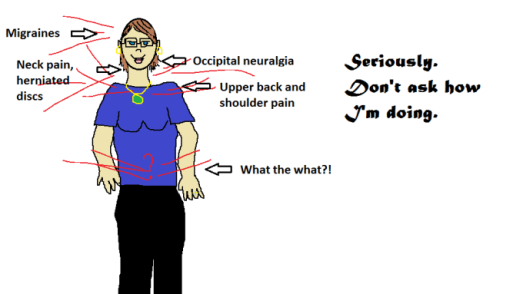Looking through my much neglected blog, I noticed that people seem to like reading the post about my colonoscopy-prep more than anything else. Not that I blame anyone for being attracted to that post… pooping fire and then having a stranger shove a hose up your butt is one of those experiences that binds us ALL together. Plus, as I think we can all agree, poop is funny. However, I thought a small fragment of people may have read that post because it really provides an unedited, unabashed experience of what it’s like to go through colonoscopy-prep. Perhaps that was useful to some people. Hence, here is my experience with Botox injections.
I’ve gotten Botox injections for chronic migraines a lot of times now… hmm… I haven’t counted, but let’s say something like 10 times. If you are considering getting Botox injections for chronic migraines or some other chronic headache condition, you may be feeling the same way I felt before getting my injections… some combination of scared, skeptical, vain, and cautiously hopeful. Those are all good things to feel, all of them make sense. But I think I can take away a bit of the mystery for you and explain exactly what you can expect, and hopefully, a bit of the fear involved will dissipate at the very least. Actually, maybe the best way to go about this is to tell you what you’ll expect in one section, and then give you some side tips in another section. Here we go…
Part I: Botox injections 101: HELLO! WELCOME to this is what it’s like to get Botox injections! Woohoo! Seriously, woohoo, this shit might really help you. I have two other migrainey friends who have success with Botox injections, and indeed, I’ve come across zero people who’ve had NO positive changes after the injections. So you’re on a good path here. First, you’ll need to find a good doctor to do the injections. This should be someone who is a migraine/headache specialist and/or a neurologist. People who do plastic surgery work may try to trick you into thinking they can do the injections… ignore them. Find a neurologist who knows what’s up. Botox injections given for aesthetic reasons are completely different. They use much higher doses of the medicine and they do not inject the same muscle groups all the time. Indeed, people accustomed to giving Botox injections for aesthetic purposes may be dandy with a needle but they are used to purposefully paralyzing portions of the face. That’s not what you want. You want someone who understands the underlying muscle groups and how they respond to Botox injections related to migraines. I can’t stress this enough.
Once you’ve found your doctor, you will need to call your insurance company and bitch for a while. Most companies will pay for the Botox injections on a trial basis. They want to ascertain whether or not it works for you, so basically, you have to tell your doctor exactly how many migraines you get a week and how bad they are (you are typically covered by insurance for Botox injections if you have 15 out of 30 days a month with migraines, or thereabouts). Then after the injections, they ask you again, and basically they’re looking to see any improvement. Good news is, if the injections improve your migraines, most insurance companies will continue to pay. Don’t be afraid to fight them for it. Oh and… don’t tell the insurance companies I said this, but feel free to exaggerate a tiny bit about how much the injections have helped, so long as they have helped. Insurance companies may try to screw you out of a really useful treatment if it hasn’t fulfilled their standards of what is “helpful”. As any migraineur knows, ANY amount of improvement is a great relief. I have noticed that doctors will either tacitly permit exaggeration when you fill out forms, or actively tell you to exaggerate. But all of this is for the second round of injections, so just remember that for your second appointment. Back to the first appointment: Assuming you get through the labyrinthine vortex of insurance debacles, you’ll make your appointment to get the shots. Make sure you contact your health insurance company AGAIN to see if they are sending your doctor’s office the Botox prescription in a timely manner. Trust me.
BUM bum BUUUUUUUMMMMM the day has arrived. Go to get your injections with a hair tie if you have long hair. Wear a shirt that has a wide neck and/or is stretchy, unless you don’t mind changing temporarily (some of the shots are on the top of the back). Don’t wear makeup, or if you do, bring more with you to the appointment because you’ll need to fix it later. If you care what your hair looks like after this, take a brush or comb. If you are nervous, which you probably are if this is your first time, you can certainly bring a loved one along to hold your hand. The doctors are generally accommodating of this. I used to bring music along, as well, to calm me. I no longer need it, but it was really helpful when I was more nervous.
When you get to the office, they’ll take your vitals and you’ll sit in a regular ol’ doctor’s office, sweating your balls or ovaries off and wondering why the scale said such a god awful number. While you sit there worrying, you’ll probably see a set of needles and alcohol swabs laid out before you. Hey guess what? Those are going in your head! Most doctors set all of this up in advance so they don’t have to refill needles or anything like that. After all, they have exactly 31 shots to give you and it wouldn’t be fun for you if you had to sit there waiting in between shots for the doctor to suck more Botox out of a bottle into a syringe. This set up is also used very often because the doctor may wish to use different sized needles. The needles that go into your face are going to be SUPER tiny. Not so tiny that you won’t feel them, unfortunately, but waaaay smaller than most needles you have seen in the past, most likely. The needles they use for your neck and upper back are larger, but fear not, those shots are less painful than the face/head shots.
Finally your doctor will come in and have you assume the position. Actually, there are two possible positions to begin with: sitting in a chair or laying belly up on an examination table. Either way, they will then proceed to sterilize your face where they’re gonna inject you. It’s just a bunch of alcohol, no big deal. Here’s where they’re gonna inject you:
 All the places where they have the little white dots… that’s where they’re gonna stick you with a scary needle! Seriously, it’s not that bad. They start with the front of the face injections, always with the one between your eyes. Then very quickly, they will move onto the rest of your face. See the injections labeled “C”? If you are worried about retaining some movement in your eyebrows (you will definitely lose a little bit of movement no matter what), talk to them about those injections and see if they can get them as high as possible, even at the hairline. A very good injector will be able to accommodate you. Here’s what I was afraid my face would look like after Botox injections:
All the places where they have the little white dots… that’s where they’re gonna stick you with a scary needle! Seriously, it’s not that bad. They start with the front of the face injections, always with the one between your eyes. Then very quickly, they will move onto the rest of your face. See the injections labeled “C”? If you are worried about retaining some movement in your eyebrows (you will definitely lose a little bit of movement no matter what), talk to them about those injections and see if they can get them as high as possible, even at the hairline. A very good injector will be able to accommodate you. Here’s what I was afraid my face would look like after Botox injections:

But really, here’s what my face can do (well only SOME of what it can do) with the Botox injections, which only impact your forehead in terms of facial movement:





See?? I can move things! It’s not so bad. Note how I can even move eyebrows individually. I’m fancy like that. As for the pain of the face injections, I find them the most unpleasant, but everyone has their “favorites” and least “favorites”. They are really not too painful. Think of it this way: when you get a shot, you are generally getting a lot of fluid going into your body. These injections use very little of the Botox so the injections themselves are extremely quick.
After the face is done, your doctor will sanitize the sides of your head and the back of your head (shown in the middle two pictures of injection cites, letters “D” and “E”. I find the “D” injections a bit unnerving because they are basically on some muscles that have to do with your jaw. It’s weird and sometimes you’ll hear peculiar sounds since the injections are so close to your ear, but this is totally normal. And finally, the doctor will take care of the last injections, the “F” and “G” injection areas seen in the right-most picture. If you have long hair, the doctor may ask you to put it high up on your head with a hair elastic for D-G. The doctor may use a slightly larger needle for the “F” and “G” injection sites, but trust me, you won’t be able to tell the difference. Those area of your body are way less sensitive than your face and head. In fact, those injections barely hurt at all in my experience.
YOU’RE DONE! Your doctor will periodically wipe blood off your face (remember: the face bleeds very easily so if you have blood dripping down your face, it’s totally okay and normal… kind of bad ass). They may also rub the areas where you’ve gotten your injections vigorously, which is also normal. This is to distribute the medication. If they don’t do it, you’ll still be fine, you’ll just look a little lumpier for a short time (an hour or two). Your doctor will now make sure you’re not going to pass out or something, which is unlikely unless you have a needle or blood phobia, and then you will go home (or even to work… now you see why I recommended bringing makeup and/or a brush or comb if you’re going to work).
Okay, now for Part II. The tips and tricks that doctors may or may not tell you.
1. After your injections, take an Aleve immediately (remember: take Aleve with food, it can be abrasive to your tummy). If your doctor permits you, you might consider taking a muscle relaxant as well (many migraineurs have muscle relaxants prescribed to them so it wouldn’t be a new medication or anything like that). I find the Aleve (naproxen sodium) is EXTREMELY useful right at this moment because the injection areas may get tender and slightly swollen. Not really visibly swollen, but tender enough that taking some preemptive Aleve can make all the difference in your recovery.
2. You may feel a bit woozy, which is not because the Botox has been injected poorly, but just because you had a lot of adrenaline pumping through your veins when you were getting all those injections, and now you’re coming down from that delightful, terror-ridden high. I’ve noticed that after the injections I’ll just feel a little tired, very much the same feeling I get if I take one Benadryl. But everyone’s different.
3. Sometimes people get a kind of “Jack Nicholson Effect” from the injections when they’re first given, which goes away in a day or two. This only happened to me the first two times I got injections for some reason. Basically the outermost portions of your eyebrows lift up, and it’s kind of hilarious. To think that some people do this on purpose….

I mean, he’s a stunning man and all, it’s just not an eyebrow look I’m trying to emulate.
4. Whatever, if Jack Nicholson makes an appearance on your face, it goes away pretty quickly. And then you will need to wait about 1-2 weeks before the Botox is FULLY working. In other words, if you’re still getting the same exact amount of migraines right after the injections, don’t worry. You MAY find that the injections wear off a little bit before the insurance company is willing to pay for them again (the FDA has approved Botox injections for chronic migraine every 90 days). Therefore, be extra careful to avoid your migraine triggers around the time the injections will wear off, and around the time when you get your injections. Keep your stress levels down, stop huffing paint, that sort of thing. And if you can schedule your injections to NOT coincide with your menstrual cycle if you happen to menstruate, that is helpful as well, because your hormonal levels go bonkers when you’re menstruating and that in itself can bring on a migraine. For all the above reasons, make certain you get these injections in exactly 90 days, or as close as possible to 90 days. You do not want to wait longer because the efficacy begins to decrease.
5. Botox injections sometimes only work a little bit the first time, or not at all. This does NOT mean it won’t work the second time. In fact, the injections have had a cumulative impact on me. At first it helped a little, but over time I went from 3-4 migraines a week to 1 or fewer migraines per week! Which is the difference between having a life and not having a life… it’s a big difference.
6. You might get tiny bruises from your injections. Get over it, they’re small and they go away. 😛
7. People are gonna make all kinds of jokes about Hollywood and facial rejuvenation whenever you talk about the Botox injections. You will have to appease them and/or tune it out.
8. You are not gonna look like a freak after getting these injections. AGAIN: they inject far less into your face than they would have if the injections were for cosmetic purposes. The only time you’d have to worry is if you have someone injecting you without experience injection Botox for migraine treatment. So just don’t do that, silly! The most common sign that the injections have been done incorrectly is if the upper lids of your eyes begin to droop a bit. But remember, even if this happens (it has never happened to me because I see reputable doctors), it will go away within 3 months time.
9. Finally, a word of encouragement: Botox injections and their alleviation of migraine pain was discovered when a woman suffering from chronic migraines got injections for cosmetic purposes and noticed that her migraines almost completely went away. The doctor found that rather astonishing and the company that creates Botox saw an opportunity to tap into the sick community rather than being limited to mostly the plastic surgery community. Studies were done, positive results were found, and voila, here we are.
If you’re thinking about getting Botox injections because you have frequent migraines, give it a shot (haha, sorry… puns are fun). Seriously, you should do this. I feel dumb about how long I waited to try it.
Good luck!
Disclaimer: I am not a doctor, but I am a migraineur, and I have gotten these injections from three separate doctors. So while I can’t give you medical advice officially, I’m slightly better than “oh I heard that guy my second cousin dated three years ago said Botox injections rock…”.









 But my wonky digestive system isn’t what I wanted to talk about. I have been thinking primarily about the very life essence of people lately. What is a personality? Is it malleable? Do people really change? And in what percentages do people change? Is it that most people don’t change, but a few get “better” and many more get “worse”? Those terms are pretty subjective, but I bet we could all agree that there are certain “goodnesses” we can all agree on (kindness, love, truth, generosity) and uh… “badnesses” (haha, okay, sorry about how awful these words are) that don’t sound so great to anyone (cruelty, prejudice, greed, hate, violence). I grapple with these questions because I feel myself changing as I have watched my friends and family change or stay the same as the case may be. Being pleasantly surprised by the change or stasis is a rarity… usually I find myself disappointed in who people truly turn out to be.
But my wonky digestive system isn’t what I wanted to talk about. I have been thinking primarily about the very life essence of people lately. What is a personality? Is it malleable? Do people really change? And in what percentages do people change? Is it that most people don’t change, but a few get “better” and many more get “worse”? Those terms are pretty subjective, but I bet we could all agree that there are certain “goodnesses” we can all agree on (kindness, love, truth, generosity) and uh… “badnesses” (haha, okay, sorry about how awful these words are) that don’t sound so great to anyone (cruelty, prejudice, greed, hate, violence). I grapple with these questions because I feel myself changing as I have watched my friends and family change or stay the same as the case may be. Being pleasantly surprised by the change or stasis is a rarity… usually I find myself disappointed in who people truly turn out to be.